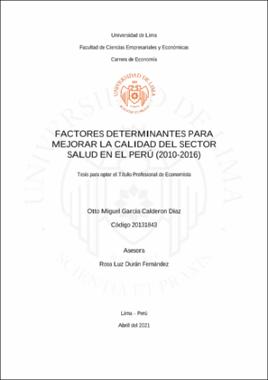| dc.contributor.advisor | Durán Fernández, Rosa Luz | |
| dc.contributor.author | García Calderón Díaz, Otto Miguel | |
| dc.date.accessioned | 2021-08-11T02:44:29Z | |
| dc.date.available | 2021-08-11T02:44:29Z | |
| dc.date.issued | 2021 | |
| dc.identifier.citation | García Calderón Díaz, O. M. (2021). Factores determinantes para mejorar la calidad del sector salud en el Perú (2010-2016) [Tesis para optar el Título Profesional de Economista, Universidad de Lima]. Repositorio Institucional de la Universidad de Lima. https://hdl.handle.net/20.500.12724/13872 | es_PE |
| dc.identifier.uri | https://hdl.handle.net/20.500.12724/13872 | |
| dc.description.abstract | Health is a right to physical, mental and social well-being that every human should be able to access and provide that coverage, granted by the State, is one of the objectives of Peru. Likewise, health and the economy are closely related both from the perspective of population well-being as a fundamental factor for productivity and human capital formation and in the influence that a good health system has on the development of the economy in a country. Therefore, making the right decisions about the correct investment of the public budget in this sector is essential to improve the economy along with the quality of health within any country. In this work, the quality of health is measured through the percentage of registered sick population and the degree to which it is affected is analyzed against five independent variables: Number of Doctors per 10,000 Inhabitants, Number of Nurses per 10,000 inhabitants, Annual Public Budget Awarded to the Health Sector, Health Infrastructure per Km2 and Years of Education in People Over 15 Years of Age. What's more; The study works with the information of the National Institute of Statistics and Informatics (INEI) under a data panel analysis of random effect on the data base used. The results show that investment in infrastructure is not very effective in improving health quality, unlike investing in prioritizing having a greater number of doctors per inhabitant; contrary to prioritizing the increase in nursing professionals, regardless of the variation of any other factor. The conclusions demonstrate the importance of the study to understand and provide recommendations that allow the development of effective policies that improve the quality of health in the country. | en_EN |
| dc.description.abstract | La salud es un derecho de bienestar físico, mental y social al que todo humano debe poder acceder y brindar esa cobertura, otorgada por el Estado, es uno de los objetivos del Perú. Así mismo, la salud y la economía guardan una cercana relación tanto desde la perspectiva del bienestar poblacional como factor fundamental para la productividad y formación de capital humano como en la influencia que tiene un buen sistema de salud para el desarrollo de la economía en un país. Por ello, tomar decisiones acertadas sobre la correcta inversión del presupuesto público en este sector es esencial para mejorar la economía junto con la calidad de salud dentro de cualquier país. En este trabajo se mide la calidad de salud a través del porcentaje de población enferma registrada y se analiza el grado en que se ve afectado frente a cinco variables independientes: Número de Médicos por cada 10,000 Habitantes, Número de Enfermeras(os) por cada 10,000 habitantes, Presupuesto Público Anual Otorgado al Sector Salud, Infraestructura de Salud por Km2 y Años de Educación en Personas Mayores de 15 Años. Además; el estudio trabaja con la información del Instituto Nacional de Estadística e Informática (INEI) bajo un análisis de panel data de efecto aleatorio sobre la base de datos utilizada. Los resultados muestran que la inversión en infraestructura es poco efectiva para mejorar la calidad de salud a diferencia de invertir en priorizar disponer de un mayor número de médicos por habitante; contrario a priorizar el aumento de profesionales de enfermería, independiente de la variación de cualquier otro factor. Las conclusiones demuestran la importancia del estudio para comprender y brindar recomendaciones que permitan el desarrollo de políticas efectivas que mejoren la calidad de salud en el país. | es_PE |
| dc.format | application/pdf | |
| dc.language.iso | spa | |
| dc.publisher | Universidad de Lima | |
| dc.rights | info:eu-repo/semantics/openAccess | * |
| dc.rights.uri | https://creativecommons.org/licenses/by-nc-sa/4.0/ | * |
| dc.source | Repositorio Institucional - Ulima | es_PE |
| dc.source | Universidad de Lima | es_PE |
| dc.subject | Health | en_EN |
| dc.subject | Quality control | en_EN |
| dc.subject | Salud | es_PE |
| dc.subject | Control de calidad | es_PE |
| dc.subject | Perú | es_PE |
| dc.title | Factores determinantes para mejorar la calidad del sector salud en el Perú (2010-2016) | es_PE |
| dc.type | info:eu-repo/semantics/bachelorThesis | |
| thesis.degree.level | Título Profesional | es_PE |
| thesis.degree.discipline | Economía | es_PE |
| thesis.degree.grantor | Universidad de Lima. Facultad de Ciencias Empresariales y Económicas | es_PE |
| dc.publisher.country | PE | |
| dc.type.other | Tesis | |
| thesis.degree.name | Economista | es_PE |
| renati.advisor.orcid | https://orcid.org/0000-0002-2437-8257 | |
| renati.discipline | 311016 | |
| renati.author.dni | 70030089 | |
| renati.level | https://purl.org/pe-repo/renati/level#tituloProfesional | * |
| renati.advisor.dni | 8136664 | |
| renati.juror | Ambrocio Barrios, Napoleón | |
| renati.juror | Durán Fernández, Rosa Luz | |
| renati.juror | Burns O'Hara, Alan Robert | |
| renati.type | https://purl.org/pe-repo/renati/type#tesis | * |
| dc.subject.ocde | https://purl.org/pe-repo/ocde/ford#5.02.01 | |
| ulima.lineadeinvestigacion | 5300 – 2. B4 | |
| ulima.cat | OI | |



